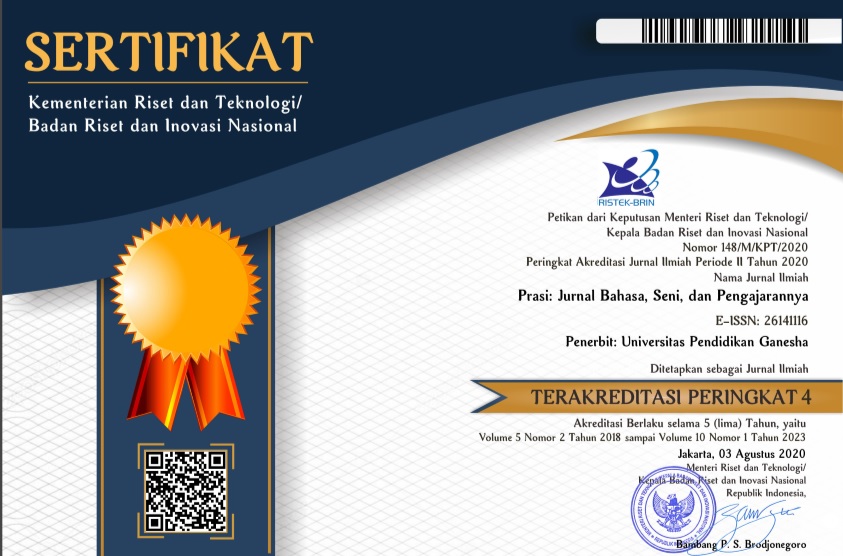BENTUK DAN MAKNA UNGKAPAN BAHASA JEPANG DALAM NOVEL NORWEY NO MORI KARYA HARUKI MURAKAMI SEBAGAI ALAT INTERAKSI SOSIAL
DOI:
https://doi.org/10.23887/prasi.v10i20.8916Abstract
In Japanese language, there are various greeting expressions according to the situation or season. Japanese people greet each other in many different ways depending on the relationship you have with the person you are greeting. Japanese can be roughly separated into three levels of politeness; casual, polite, and honorific/humble. Social status of speaker and listener should be considered. Japanese expressions are sometimes have difficulty to find a equivalent into Indonesian language. Therefore, to avoid language of mistakes , it is necessary to know how to use the Japanese expression correctly especially to Japanese learners. This research is the analysis of how to say greeting, thank you, apology expressions in Japanese and how the meaning of an expression of Japanese Language in the novel Norwey no Mori by Haruki Murakami. The method that used in this research is descriptive method. In analyzed form and the meaning of Japanese expressions, writer used Pateda theory (2001) and based on the concept of Edizal (2001), which analyzed how to equivalent the meaning of Japanese expression into Indonesian Language. The research result in novel Norwey no Mori by Haruki Murakami shows the usage of greeting or daily Japanese expressions are Chotto, Anata, Watashi, Iie (iya/uun), Wakaru dan wakaranai, Taihen, Anou, Sukoshi, Sayounara, Moshimoshi, Okagede, Kekkou. And the expressions for saying thank you and apology are Daijoubu, Arigatou, Gomennasai, Doumo. The data are then analyzed how to equivalent the meaning of Japanese expressions into Indonesian language based on formal, informal situation and Japanese cultural.
Keywords: Japanese expression, greeting, thank you and apology expression
Downloads
Published
Issue
Section
License
Authors who publish with Prasi agree to the following terms:- Authors retain copyright and grant the journal the right of first publication with the work simultaneously licensed under a Creative Commons Attribution License (CC BY-SA 4.0) that allows others to share the work with an acknowledgment of the work's authorship and initial publication in this journal
- Authors are able to enter into separate, additional contractual arrangements for the non-exclusive distribution of the journal's published version of the work (e.g., post it to an institutional repository or publish it in a book), with an acknowledgment of its initial publication in this journal.
- Authors are permitted and encouraged to post their work online (e.g., in institutional repositories or on their website) prior to and during the submission process, as it can lead to productive exchanges, as well as earlier and greater citation of published work. (See The Effect of Open Access)


.png)
.png)









